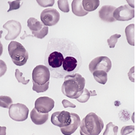Articles tagged with: MGUS
NewsFlash »
Study Reveals Genetic Differences Between MGUS And Multiple Myeloma – In a recent study, Spanish researchers identified chromosomal abnormalities that were more frequent in patients with active mutiple myeloma than in patients with smoldering myeloma and monoclonal gammopathy of undetermined significance (MGUS), a condition that may later progress to smoldering or active myeloma. The researchers also found that chromosomal abnormalities tend to be more frequent in active myeloma patients than in smoldering myeloma patients, and also more frequent in smoldering myeloma patients than in MGUS patients. For more information, please see the study in Leukemia (abstract).
sCD105 Protein May Be An Indicator For Myeloma Severity – Results of a recent study show that levels of the protein sCD105 circulating in the blood are higher in multiple myeloma patients than in healthy individuals. Higher levels of sCD105 also were associated with more advanced stages of disease. sCD105 is known to play a role in the growth of new blood vessels and may thus contribute to tumor progression in myeloma. Researchers believe these findings warrant further study of sCD105 levels as an indicator for disease activity. For more information, please see the study in the European Journal of Internal Medicine (abstract).
Whole Body MRI Adds Limited Value To Routine Myeloma Remission Testing After Transplantation – A recent study found that the use of whole body magnetic resonance imaging (MRI) to detect persisting or relapsing multiple myeloma post transplant offers little added value compared to current routine laboratory tests. The results of the whole body MRI and routine laboratory tests were in agreement in 79 percent of the patients assessed. For more information, please see the study in European Radiology (abstract).
IMF Myeloma Workshop For Patients And Families – The International Myeloma Foundation (IMF) will be hosting a workshop for multiple myeloma patients and their families on May 19 in Indianapolis, IN. Dr. Rafat Abonour from the Indiana University Bone Marrow and Stem Cell Transplantation Program and nurse Kena Miller from the Roswell Park Cancer Institute in Buffalo, NY, will speak about topics including treatment options, managing side effects, and local clinical trials. For more information or to register, please visit the IMF website.
For a more detailed listing of myeloma-related events, please check the Myeloma Beacon Events Calendar.
NewsFlash »
Progression From MGUS To Myeloma Is Similar Among Japanese And Westerners – A recent study found that Japanese people with monoclonal gammopathy of undetermined significance (MGUS) progressed to multiple myeloma at rates similar to those previously reported for Westerners. Specifically, the results showed that 3 percent progressed within 5 years, 9 percent within 10 years, 11.4 percent within 15 years, and 32.1 percent within 20 years. For more information, see the study in the journal Rinsho Ketsueki (abstract).
Pomalidomide May Be Effective In Patients With Amyloidosis – Results from a Phase 2 study show that pomalidomide plus dexamethasone (Decadron), a combination being studied for the treatment of multiple myeloma, may also be effective in previously treated patients with immunoglobulin light chain amyloidosis. Amyloidosis is a blood disorder that results in the abnormal accumulation of proteins in tissues and organs throughout the body. An estimated 10 percent to 15 percent of myeloma patients also develop symptoms associated with amyloidosis (see related Beacon news). Among the 33 amyloidosis patients included in the study, 48 percent had improved blood cell counts and 15 percent had organ improvement after treatment with pomalidomide and dexamethasone. The median progression-free survival was 14 months, and the median overall survival was 28 months. For more information, see the study in the journal Blood (abstract).
Participants Needed For Myeloma Risk Association Study – The International Myeloma Foundation is conducting a study to determine why certain races and family members are at an increased risk of developing multiple myeloma. The study is a brief survey that multiple myeloma patients can complete via the Internet. To participate, see the study website.
Clinical Insights Education Program – The Multiple Myeloma Research Foundation (MMRF) is sponsoring an education program for myeloma patients and their families about multiple myeloma clinical insights. The event will be held on April 27 in New York City. Myeloma experts from leading cancer centers will speak about the latest advances in frontline therapy, stem cell transplants, relapsed and refractory myeloma, supportive care, and clinical trials. A question and answer session is included in the program. Registration will begin at 9 a.m., and the program will conclude at 2:30 p.m. For more information or to register, please see the MMRF website.
For a more detailed listing of myeloma-related events, please check the Myeloma Beacon Events Calendar.
News»

According to the results of a recent large Swedish study, patients with the myeloma precursor disease monoclonal gammopathy of undetermined significance may have a higher risk of developing infections than the general population.
The researchers found that patients with monoclonal gammopathy of undetermined significance (MGUS) were more than twice as likely as the general population to develop either a bacterial or viral infection.
However, they found infections did not increase an MGUS patient’s risk of progressing to multiple myeloma.
The researchers commented that these findings may influence the surveillance and treatment of …
News»

Results of a recent study conducted in California show that patients with the myeloma precursor disease monoclonal gammopathy of undetermined significance (MGUS) do not receive adequate evaluation, follow-up, or treatment for their condition.
Based on their findings, the study authors recommended that these patients receive better care consistent with the guidelines for the management of MGUS produced by the first international consensus MGUS panel in 2009.
“[Because of inadequate evaluation], we are missing patients at risk for bone-related problems, which are more likely to occur in MGUS patients,” said Dr. James Berenson …
News»

Results of a large analysis conducted in Sweden show that multiple myeloma patients are more likely than the general population to develop certain cancers, including acute myeloid leukemia, myelodysplastic syndromes, and non-melanoma skin cancer.
Furthermore, the researchers found that patients with the myeloma precursor disease monoclonal gammopathy of undetermined significance (MGUS) also have a greater risk of developing these cancers than the general population.
Like myeloma patients, MGUS patients have abnormal proteins in the blood as a result of defective plasma cells in the bone marrow. However, unlike myeloma patients, MGUS patients …
NewsFlash »
NCI Initiates Study Of Novel Imaging Techniques To Identify Precursor Stages Of Myeloma – The National Cancer Institute (NCI) is recruiting patients for a study investigating the use of sensitive imaging technologies to identify progression of myeloma precursor diseases. There are currently no diagnostic tests available to determine whether an individual with monoclonal gammopathy of undetermined significance (MGUS) or smoldering multiple myeloma will develop multiple myeloma. New and improved imaging techniques may help physicians better detect the progression of these precursor diseases. This trial is recruiting participants with MGUS, smoldering myeloma, or myeloma. For more information, see the clinical trial description. To participate in the trial, please contact the research nurse, Mary Ann Yancey, at (301) 435-9227 or .
Phase 2 Trials Of IPH 2101 Are Recruiting Myeloma And Smoldering Myeloma Patients – Several Phase 2 clinical trials are now recruiting multiple myeloma and smoldering multiple myeloma patients to receive the experimental agent IPH 2101 (anti-KIR). IPH 2101 is an antibody drug being developed by Innate Pharma. It helps activate cells of the immune system to destroy cancer cells. IPH 2101 is being studied in patients with smoldering myeloma to see if it delays and/or prevents progression to multiple myeloma (trial description). It is also being studied in multiple myeloma patients in stable partial response after a first line therapy (trial description) and in combination with Revlimid (lenalidomide) in myeloma patients experiencing their first relapse (trial description). To participate in the smoldering myeloma trial at the National Institutes of Health, please contact the research nurse, Mary Ann Yancey, at (301) 435-9227 or .
Phase 3 Double Transplant Trial Is Currently Recruiting Myeloma Patients – Myeloma patients are now being recruited by the Hackensack University Medical Center in New Jersey to participate in a Phase 3 trial of tandem stem cell transplants with melphalan (Alkeran) followed by melphalan and Velcade (bortezomib). The purpose of this trial is to determine if the addition of Velcade to the second transplant will increase remission times. For more information, please see the clinical trial description.
Opinion»
Until 2009, it was generally accepted that monoclonal gammopathy of undetermined significance (MGUS), smoldering multiple myeloma, and multiple myeloma were three distinctly separate diseases.
If MGUS was accidentally discovered during a patient’s routine medical testing, the patient was often advised to ignore the abnormal test results for the foreseeable future. Most clinical settings encouraged only infrequent routine monitoring, since both MGUS and smoldering myeloma conditions were considered distinct diseases with a small probability of the patient developing multiple myeloma. Often the patient’s personal primary care physician provided any follow-up periodic monitoring.
2009 …

